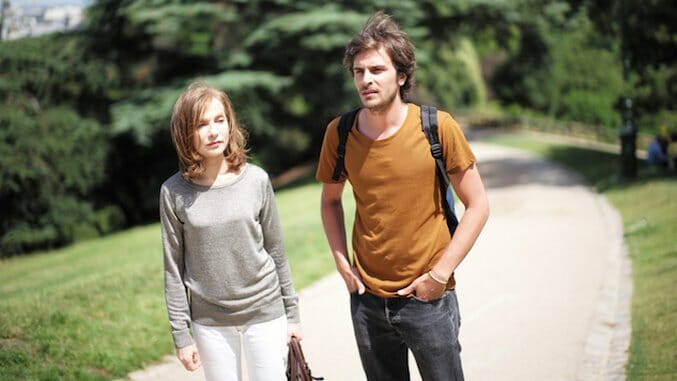Things to Come (2016 TIFF)

In French director Mia Hansen-Løve’s films, nothing lasts. Life’s irritating fleetingness dominates the proceedings: A husband dies, a burgeoning music career flames out, a passionate love affair fades. Her latest, Things to Come, takes this theme to its logical conclusion, looking at the travails of an older woman who watches one element of her life after another get stripped away. The film’s power is its recognition that, no matter how hard life gets, though, it just keeps going. In fact, that’s what makes existence oddly beautiful.
The film stars Isabelle Huppert as Nathalie, a wife, mother and philosophy teacher in her 60s. Nothing catastrophic happens to Nathalie in Things to Come, an outcome that’s entirely familiar to anyone who’s weathered a rough patch. It’s never a single incident—it’s the small, seemingly endless accumulation of annoyances that beats us down.
First, she learns that her revered philosophy textbook is going to get bastardized for its new edition, the publisher wanting to boost sales by giving it a flashier, dumbed-down design. Then, her aged mother (Edith Scob) starts showing signs that she needs to be moved to a nursing home. Also, her husband (André Marcon) has fallen in love with someone else, which prompts her to get out of the marriage.
In a conventional Hollywood film, this litany of occurrences would be presented in a wacky just-hang-in-there tone. Hansen-Løve (Eden, Goodbye First Love) feels the full weight of these dilemmas for their cumulative impact, which Nathalie herself slowly begins to recognize, too. At an age when shedding a skin is no easy process—there’s too many years built up of routine and familiarity—Nathalie has no guarantee that she’s not simply stepping off into an abyss. Things to Come, in other words, is about the pain of letting go while holding onto a hope that there’s something waiting on the other side.
That not-knowing is where Hansen-Løve’s movies normally reside, and she once again finds oceans of feeling in that anxiety. Although Nathalie is reunited with a former student, the handsome, sensitive young Fabien (Roman Kolinka), Things to Come never makes it clear if their rapport is merely platonic or if there could be something deeper between them. It’s in keeping with a film that’s wise enough to understand there are no easy solutions for the troubles facing Nathalie—she just has to keep slogging through each new day until something, slowly, starts to change within her.
-

-

-

-

-

-

-

-

-

-

-

-

-

-

-

-

-

-

-

-

-

-

-

-

-

-

-

-

-

-

-

-

-

-

-

-

-

-

-

-








































